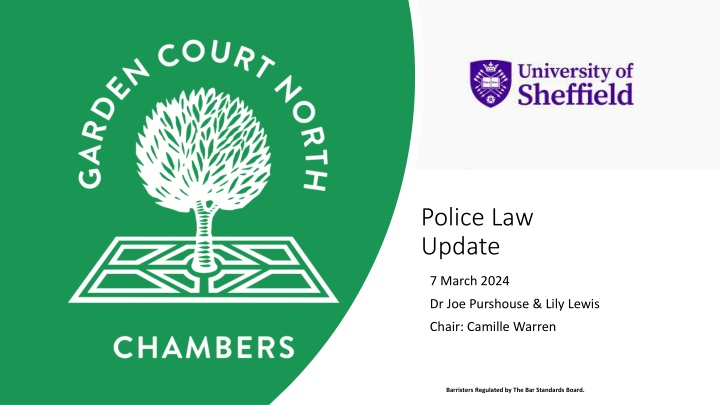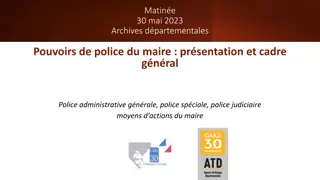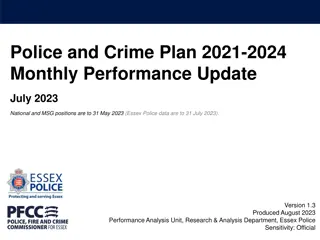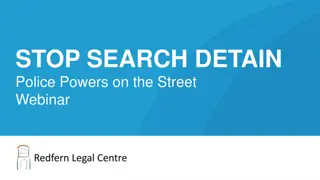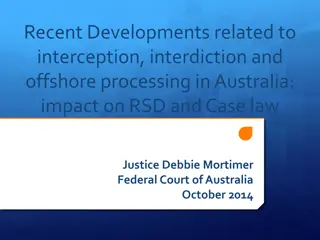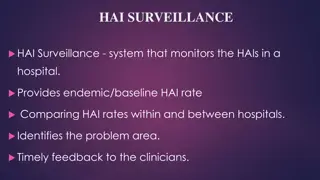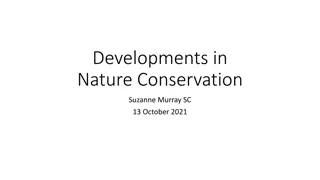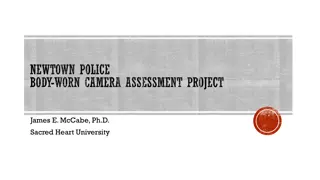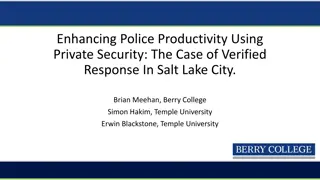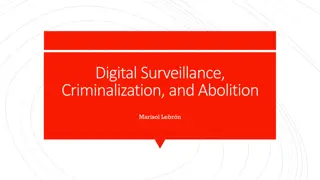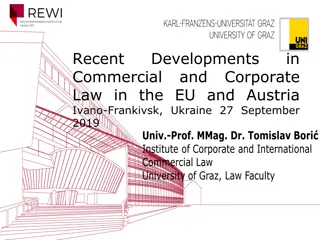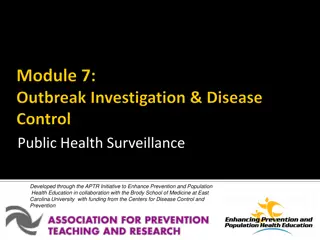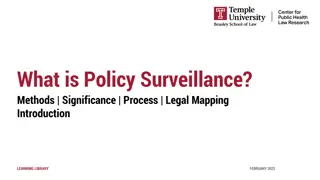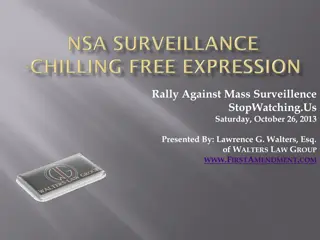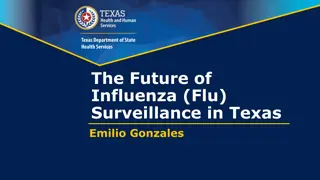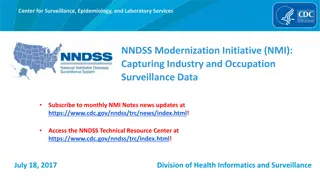Recent Legal Developments in Police Law and Surveillance Practices
This update covers recent legal developments in police law focusing on data and surveillance, misconduct and vetting, as well as torts related to police duty of care. It includes cases on data breaches, facial recognition, police information retention, and legislation impacting investigatory powers. The update also discusses the duty of care owed by the police and wider developments in the field.
Download Presentation

Please find below an Image/Link to download the presentation.
The content on the website is provided AS IS for your information and personal use only. It may not be sold, licensed, or shared on other websites without obtaining consent from the author.If you encounter any issues during the download, it is possible that the publisher has removed the file from their server.
You are allowed to download the files provided on this website for personal or commercial use, subject to the condition that they are used lawfully. All files are the property of their respective owners.
The content on the website is provided AS IS for your information and personal use only. It may not be sold, licensed, or shared on other websites without obtaining consent from the author.
E N D
Presentation Transcript
Police Law Update 7 March 2024 Dr Joe Purshouse & Lily Lewis Chair: Camille Warren Barristers Regulated by The Bar Standards Board.
Police Law Update This update: Joe - Recent developments: Data and Surveillance Torts Misconduct and vetting Lily The Undercover Policing Inquiry & related legal developments Barristers Regulated by The Bar Standards Board.
Data and Surveillance Barristers Regulated by The Bar Standards Board.
Data and Surveillance Facial recognition: - R (Bridges) v CC of SWP [2020] EWCA Civ 1058 (See. Purshouse and Campbell, Legal Studies. 2022;42(2):209-227). - Clearview AI v IC [2023] UKFTT 00819 (GRC) - Glukhin v Russia, app no. 11519/20, 4 July 2023. Data breach: - Driver v Crown Prosecution Service [2022] EWHC 2500 (KB) - CPS inadvertently reveal information pertaining to local political figure s subjection to criminal process - C indirectly identified (though not named) 4 Barristers Regulated by The Bar Standards Board.
Data and Surveillance Retention of Police Information: - R (YZ) v Chief Constable South Wales [2022] EWCA Civ 683 - AB v Chief Constable of British Transport Police [2022] EWHC 2749 (KB) - R. (on the application of Strain) v Chief Constable of Greater Manchester [2023] EWCA Civ 240 Legislation: - Data Protection and Digital Information Bill - Commentary: https://www.gov.uk/government/news/report-finds-worrying-vacuum-in- surveillance-camera-plans - Investigatory Powers (Amendment) Bill - Joint Briefing: https://www.openrightsgroup.org/publications/joint-briefing-on-the- investigatory-powers-amendment-bill/ Barristers Regulated by The Bar Standards Board.
Torts Barristers Regulated by The Bar Standards Board.
Torts Police duty of care Permission to appeal: Woodcock v Chief Constable of Northamptonshire [2023] EWHC 1062 (KB). Tindall v Chief Constable of Thames Valley Police & Ors [2022] EWCA Civ 25. Wider Developments Lewis-Ranwell v G4S Health Services & Others [2024] EWCA Civ 138 Barristers Regulated by The Bar Standards Board.
Misconduct and vetting Barristers Regulated by The Bar Standards Board.
Misconduct and vetting R (Victor) v Chief Constable of West Mercia [2023] EWHC 2119 R (Commissioner of Police of the Metropolis) v Police Appeals Tribunal & Williams [2022] EWHC 1951 (Admin) R (Commissioner of Police of the Metropolis) v Police Appeals Tribunal & Gutty [2022] EWHC 1950 (Admin). Reports Casey Review Home Office Review: The process of police officer dismissals (2023) Vetting Code of Practice (Updated) Angiolini Report: Part I (2024) Barristers Regulated by The Bar Standards Board.
The Undercover Policing Inquiry Barristers Regulated by The Bar Standards Board.
Inquiry key issues Home secretary launches public inquiry into undercover police following Lawrence report | UK news | The Guardian Undercover police had children with activists | Police | The Guardian Undercover police practices 'could have led to unsafe convictions' - BBC News Barristers Regulated by The Bar Standards Board.
Inquiry structure The Inquiry has divided its work for Modules One and Two into the following five tranches : 1. Special Demonstration Squad officers and managers and those affected by deployments (1968-1982) including the management & oversight by mid and senior officers, other agencies and government departments. 2. Special Demonstration Squad officers and managers and those affected by deployments (1983-1992) including the management & oversight by mid and senior officers, other agencies and government departments. 3. Special Demonstration Squad officers and managers and those affected by deployments (1993-2007) including the management & oversight by mid and senior officers, other agencies and government departments. 4. National Public Order Intelligence Unit officers and managers and those affected by deployments including the management & oversight by mid and senior officers, other agencies and government departments. 5. Other undercover policing and those affected by deployments including the management & oversight by mid and senior officers, other agencies and government departments. Barristers Regulated by The Bar Standards Board.
Tranche 1 Interim Report https://www.ucpi.org.uk/wp-content/uploads/2023/06/Undercover-Policing-Inquiry-Tranche-1-Interim-Report.pdf Long-term deployments into political groups inevitably required the undercover officer to befriend members of the target groups and to enter into their personal and political lives this intrusion into the lives of many hundreds of people in this era required cogent justification before it should have been contemplated as a police tactic. Deployments would require the undercover officer to gain entry to the homes of members of infiltrated groups by deceit. Many undercover officers accepted positions of responsibility within an infiltrated group, were actively encouraged to do so, and became engaged in helping to organise political activity. Public revelation of the use by police officers of the technique would have been bound to have given rise to legitimate public concern and to embarrassment to the Commissioner and to his police authority the Home Secretary. None of these issues appears to have been addressed by senior officers within the MPS or by Home Office officials during this period. "The principal, stated purpose of the SDS was to assist uniformed police to control public order in London. Long-term deployments into left-wing and anarchist groups did make a real contribution to achieving this end, even though this was or could have been achieved to a significant extent by other, less intrusive, means. The question is whether or not the end justified the means set out above. I have come to the firm conclusion that, for a unit of a police force, it did not; and that had the use of these means been publicly known at the time, the SDS would have been brought to a rapid end. Undercover policing unit tactics not justified, says report - BBC News Barristers Regulated by The Bar Standards Board.
Undercover policing: related legal developments Kate Wilson v Commissioner of the Metropolis and National Police Chiefs Council (NPCC) [2021] UKIPTrib IPT 11/167/H Violation of the Claimant s rights under Articles 3, 8, 10, 11 and 14 of the European Convention on Human Rights (ECHR). This is a formidable list of Convention violations, the severity of which is underscored in particular by the violations of Arts 3 and 14. This is not just a case about a renegade police officer who took advantage of his undercover deployment to indulge his sexual proclivities, serious though this aspect of the case unquestionably is. Our findings that the authorisations under RIPA were fatally flawed and the undercover operation could not be justified as necessary in a democratic society , as required by the ECHR, reveal disturbing and lamentable failings at the most fundamental levels. We recognise that the authorities viewed their conduct through the lens of public order, but that is not how it was experienced by the Claimant, whose bodily integrity, privacy and political activities were invaded without lawful justification. Covert Human Intelligence Sources (Criminal Conduct) Act 2021 Barristers Regulated by The Bar Standards Board.
Thank you gcn@gcnchambers.co.uk gcnchambers.co.uk 0161 817 6377 3rd Floor Blackfriars House, Parsonage, Manchester, M3 2JA. Barristers Regulated by The Bar Standards Board
